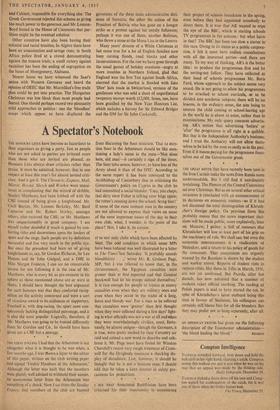THE GREAT RENTS that have recently been torn in the
Iron Curtain make the news from Russia more understandable. But I still find it inordinately tantalising. The Plenum of the Central Committee sat over Christmas. But as on several other critical occasions it concluded with an announcement Of its decisions on economic matters—as if it had not discussed the total disintegration of Khrush- chev's foreign policy. On previous form this probably means that the more important deci- sions will be made public, more explosively, later on. Moscow, I gather, is `full of rumours that Khrushchev will lose at least part of his grip on the machinery of rule. We shall see; but even the economic announcement is a vindication of Malenkov, and a return to his policy of goods for the consumer. That concessions are urgently wanted by the Russians is shown by the student and worker unrest. Reporta of student riots in various cities, like those in Tiflis in March, 1956, arc not yet confirmed. But Pravda, after hot denials, has now admitted that a number of students reject official teaching. The reading of Polish papers is said to have started the rot. In spite of Khrushchev's latest outburst being this time in favour of Stalinism, his colleagues can certainly still blame him for all the blunders. But they may prefer not to hang separately, after all.














































 Previous page
Previous page